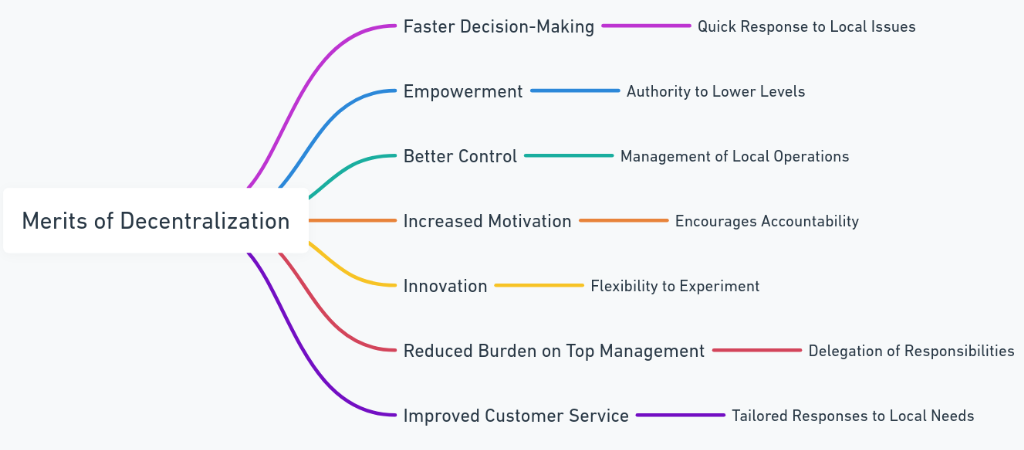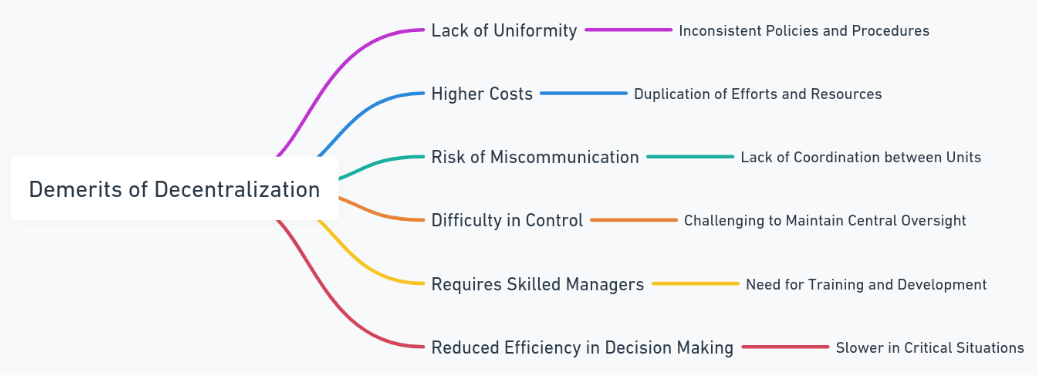Decentralization is the distribution of authority in an organization over several different levels within the organization. Instead of having top management make most of the decisions, decentralization empowers lower levels of management to make such decisions and control the resources in their own hands. This transition results in more freedom and maneuverability in departments or units, thereby enhancing organizational efficiency. Decentralization has now become the mainstream approach in this competitive modern business environment, and large organizations are only adopting it to increase the possibility for flexibility and innovation.
What is Decentralization?
Decentralization is the delegation of daily operations, decision-making, and responsibility to lower levels of the management structure, away from a central authority. This process is most beneficial for organizations having many branches, sectors, or geographical locations, whereby the local managers and employees can react quicker to on-ground situations. In contrast to centralization, the difference between decentralization is that the final decision-making authority lies strictly with the top hierarchy.

Merits of Decentralization
Decentralization offers various benefits that contribute to an organization’s efficiency and effectiveness. Below are some of the most prominent advantages:
Distribution of the Executive’s Burden
One of the first benefits of decentralization is the distribution of the executive’s burden. That is, instead of a few executives at the top of the organization handling all decision-making responsibilities, it allows power to be shared with different levels of management. That would remove the workload of top management and give them time to be strategic and for long-term planning. The other operational issues could be attended to at the lower levels thus resulting in faster resolutions and greater productivity.
Growth and Diversification
An organization grows and becomes diversified under decentralization. If more decision-making authorities are given to lower levels, the individual divisions or units may begin their operation far more independently. It has enabled rapid expansion because each division can personalize its operations to suit local demands, bypassing the requirement to seek the permission of the central authority. More entrepreneurial style is undertaken by a business under decentralization and it can enter new markets or produce new products and serve many different customer segments as efficiently as possible.
Motivation of Subordinates
Decentralization can hence prove to be an efficient motivator for subordinates. When lower-level managers and employees are given the authority to make decisions, they tend to be more responsible towards their work. Even the feeling of responsibility may increase job satisfaction and motivate them to improve their performance. Empowering employees at different levels tends not to facilitate morale alone but also promotes development into leaders and problem solvers.
Innovation and Flexibility
Another major benefit is decentralization promotes innovation and adaptability. With the dispersion of decision-making powers, innovation in an organization would be fostered by creativity and adaptability. The overall managers are closer to the marketplace and will react to changing trends, customers, as well as localized difficulties much faster. This would lead to swift and innovative decisions that keep the organization competitive in this dynamic environment.
Better Supervision and Control
Decentralization offers better control and supervision. The fact that decisions are not centralized means that the supervisors can be spread out throughout a particular department or division. Thus, this leads to a more particularized supervision whereby conditions can be corrected quickly. It is easier to handle and monitor the several smaller units, which are decentralized in nature than it would be if there were single large, centralized units. Standard and performance goals become easier to attain as responsibilities are defined at each level.
Satisfaction of Human Needs
Decentralization also meets human needs for actualization and professional development. People are perceived to be more valuable if they have decisions to make. Such perceptions lead to higher-level need fulfillment as the Maslow hierarchy would predict, fostering greater employee engagement and reducing turnover.
Efficient Communication
Another significant advantage that decentralization offers is effective and efficient communication. In the decentralized system, the decision-making powers are dispersed and there are shorter channels for communication. Thus, faster exchanges of information, quicker turnaround, and fewer bureaucratic delays exist. The employees and the managers on the lower levels may communicate directly with their teams and make decisions without waiting for authorization from top-level management.

Demerits of Decentralization
Despite its numerous advantages, decentralization also comes with some limitations that need to be addressed.
Risk of Inconsistent Decision-Making
The main disadvantage of decentralization is that there is a very large probability of having inconsistent decision-making. Distributed decision-making authorities blur the solution paths managers will apply to various problems. This inconsistency adds to confusion and inefficiency in larger organizations where sameness matters so much for brand image and customer experience.
Duplication of Efforts
Decentralization, therefore, may lead to duplication. Various divisions or departments working in decentralized patterns might pursue similar tasks or projects without co-coordinating with each other. It wastes time, money, and human resources, which are all collectively wastes for the organization, hence affecting its total efficiency.
Loss of Control
The potential loss of control for top management is another important disadvantage of decentralization. Decentralization includes the passing of authority for decision-making down to lower levels, and sometimes this may make central leadership lose some degree of oversight over operations. This may be particularly worrying in areas of business that may relate to finance and strategic planning, where the retention of centralized control ensures that all operations are consistent with the company’s risk mitigation measures.
High Costs
Decentralization, therefore, may lead to duplication. Various divisions or departments working in decentralized patterns might pursue similar tasks or projects without co-coordinating with each other. It wastes time, money, and human resources, which are all collectively wastes for the organization, hence affecting its total efficiency.
Difficulty in Coordination
Finally, decentralization may create coordination difficulties. Since all units or departments are semi-autonomous, coordination between departments becomes next to impossible. Here, there are also chances of fragmentation in decision-making and failure to exploit opportunities lying before them to collaborate.
Conclusion
The key area where decentralization aids the responsiveness and flexibility of an organization is in its decision-making apparatus. Without a doubt, it has several advantages, notably, spreading the burden of the executive, encouraging innovation, and better communication. Its drawbacks—ineffective decision-making and loss of control thwart organizational success if not managed well. Hence, a balancing of centralization and decentralization will have to take place to fully experience the fruits of both structures.
Merits of Decentralization FAQs
What is decentralization?
Decentralization is the distribution of decision-making authority to lower levels in an organization.
What are the primary merits of decentralization?
Some of the primary merits include the distribution of the executive’s burden, enhanced innovation, better supervision, and increased motivation among employees.
What are the risks associated with decentralization?
Risks include inconsistent decision-making, duplication of efforts, and potential loss of control for top management.
Can decentralization lead to better communication?
Yes, decentralization often results in shorter communication channels and faster decision-making.
What is the relationship between decentralization and innovation?
Decentralization fosters innovation by giving lower-level managers the freedom to experiment and respond quickly to market changes.

